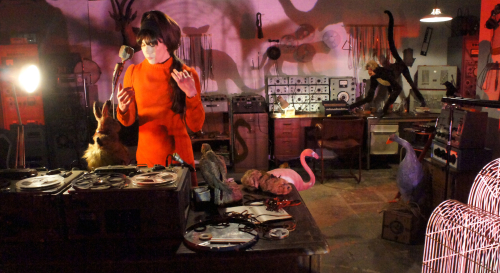
The BFI London Film Festival
MOVIE REVIEW
Delia Derbyshire: The Myths and Legendary Tapes (2020)
It must be quite a millstone, to be so famous for only one thing. And the millstone must be even heavier when you weren’t publicly credited for the one thing you were famous for until 12 years after your death. The Britain is revisiting the history of Delia Derbyshire, the composer of the unmistakable theme song to the juggernaut TV show “Doctor Who.” This documentary has been billed as a “phantom collaboration” between some newly discovered works of Derbyshire’s and that of legendary performance artist Cosey Fanni Tutti (one of the founders of Throbbing Gristle). It is that, but it is more about the limits of exploring a largely undocumented life, and where imagination can, or cannot, fill the gaps.
Writer-director Caroline Catz, who also stars as Derbyshire in the re-enactments, has made a hybrid film here: not quite talking-head documentary; not quite fictionalized re-enactments; not quite performance art; not quite a fountain of sound. By necessity the film focuses mostly on Derbyshire’s decade working at the BBC’s Stereophonic Workshop – an odd department that was a combination Foley studio, manual editing suite and non-musical sound archive. Derbyshire and her colleagues provided the soundtracks for TV and radio shows, generally solving all the weird problems that came the production studio’s way. We learn a bit about how Derbyshire ended up there – she lived through the Coventry blitz as a kindergartner, studied mathematics at university and maintained a fascination for psycho-acoustics: how the world around us is represented through noise. The movie skips between Derbyshire in the studio or working on side projects (her collaborator Brian Hodgson, who is interviewed, is notably played as a young man by Julian Rhind-Tutt), with a soundtrack of some recordings found in 2001 by Ms. Tutti. But her life after leaving the stereophonic workshop is almost completely glossed over, not least because it involved alcoholism, which is a shame.
The movie means so well, but it doesn’t quite work. Derbyshire was a lonely visionary – parallels with the photographer Vivian Maier should certainly be made – and it’s not quite certain we’ve caught up to her yet. Her intelligence and idiosyncratic way of perceiving the world was certainly well ahead of its time – that theme tune has never lost its peculiar haunting freshness over the years. Through all of “Doctor Who’s” constant reinvention, that is the one thing it has never really changed. While watching Derbyshire flirt with other musicians, get really into snuff, and argue with her boss is interesting – and the reenactments are mainly shot by Nick Gillespie under a creepy darkroom light, giving the images a saturated reddish glow that’s instantly appealing – but it doesn’t get us any deeper inside her head. Listening to Ms. Tutti talk about how she’s been influenced by Derbyshire’s work is also not quite the point. It would have been so much more interesting if the music had been allowed to play and we could have attempted to listen to the world as she heard it. It’s an appreciative and thoughtful homage, but not quite the exploration of her work and life that Derbyshire is due.
Comments